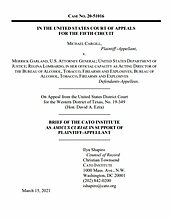Learn more about Cato’s Amicus Briefs Program.
Before the tragic mass shooting in Las Vegas, almost nobody in the United States had ever heard of a “bump stock.” What was, and always has been, a gun‐range novelty was suddenly the subject of national discussion. In the following months, Congress considered and ultimately rejected a law banning these devices. Eager to seize political capital, however, the Trump administration simply reinterpreted an existing law to ban these devices without lawmaker input.
Specifically, the administration changed its long‐held interpretation of “machineguns” to include bump stocks. This expansion of regulatory authority, motivated by political expediency, cannot stand. Regardless how one feels about gun regulation, there is far more at stake than bump stocks. The executive branch must not be permitted to rewrite criminal laws.
The new rule took effect on March 26, 2019, making felons of an unknowable number of Americans. In order to avoid criminal liability for a bump stock he’d legally purchased, Michael Cargill, with the assistance of the New Civil Liberties Alliance, filed suit in a federal district court in Texas, seeking to stop the new rule. After being denied by the district court, he appealed, and now the case is before the Fifth Circuit court.
Building on our participation in related cases, the Cato Institute today filed a brief in support of Mr. Cargill. We argue that the agency’s administrative record demonstrates no more expertise than any legal brief submitted by the government and, therefore, does not warrant deference.

This work is licensed under a Creative Commons Attribution-NonCommercial-ShareAlike 4.0 International License.



